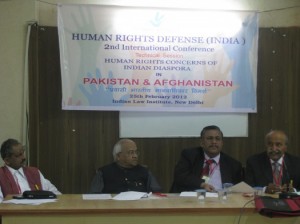 New Delhi, February 25: The second and final day of the 2nd International Conference on Human Rights Concerns of Indian Diaspora saw some brainstorming sessions on the issues of human rights violations of Indians in Malaysia, Sri Lanka, Pakistan, Afghanistan, Bangladesh among others.
New Delhi, February 25: The second and final day of the 2nd International Conference on Human Rights Concerns of Indian Diaspora saw some brainstorming sessions on the issues of human rights violations of Indians in Malaysia, Sri Lanka, Pakistan, Afghanistan, Bangladesh among others.
In a session on Sri Lanka, speakers which included Karim Assaad, M N Krisknamani, President, HRDI, expressed their concern on the state of the suffering Tamil population in Sri Lanka. Assaad spoke on how the democratic rights of the Tamils in Sri Lanka have been neglected. A draft resolution was passed that urgent steps should be taken to compel the Sri Lankan government to stop ethic and linguistic discrimination against the Tamil in Sri Lanka. It was also agreed upon by the organization that the Union government of India should be asked to initiate talks with Sri Lankan government at diplomatic levels so that the human rights violation and injustice on the Tamils in Sri Lanka are averted. The draft resolution also added that a request should be made to the United Nations to actively interfere to remove the human rights violations meted out to Tamils by sending an independent team to ascertain the ground realities.
In a session on Malaysia which was moderated by Chairman of the organising committee Gopal Agarwal, well known scholar Datuk A Vaithilingam said that thousands of Indian workers have been made to live in the worst of conditions as indentured ones in Malaysia. He added that most people of Indian origin live in economic neglect. A major cause of concern, Vaithilingam said was the growing fundamentalism of the nation’s government. Vaithilingam said that India must look into the plight of PIOs.
P Waytha Moorthy, a Malaysian lawyer of Tamil origin who has fought for the human rights concerns of Malaysian Tamils said that Malaysian government should think of Malaysia-born Indians who have been living a life in stateless misery for past many years. He further said that the Malaysian government has blatantly denied basic human rights to millions of minority Malaysians.
Chitra, a research scholar working on the conditions of Tamils in Gulf countries, while speaking on the human rights concerns of Indians in Gulf countries highlighted the push (poverty, competition in local markets etc.) and pull (higher income, oil) factors which attract the Indians to move towards these countries. She said that loss of identity while landing in a Gulf country, wage discrimination and religious biasness are amongst the major human rights violations faced by Indians in the Gulf nations. She also focused on the how the nexus of recruiting agencies and employees lure the workers in an inappropriate manner towards these oil-rich nations.
In the session to deliberate over the human rights issues in Pakistan and Afghanistan, the plight of Hindus was discussed in an intense manner. Issues regarding the conditions of persons of Indian origin in these countries were strongly raised. Ram Singh Sodho, a well-known politician from Pakistan’s southern Sindh province who resigned in 2011 and has since moved to India, focused on the ordeals faced by Hindus living in Pakistan. He said that the major problems faced by forty percent of Hindu in Pakistan are that of forcible religious conversions and strict visa regulations. “Although each and every Hindu residing in Pakistan wants to move over to India, the strict visa rules make them stop from taking the move,” said Sodho. He also said that Pakistani Hindus are denied even to die with dignity, as they are barred from cremating the dead bodies. Senior journalist Ved Pratap Vaidik, sharing anecdotes on his visits to Pakistan and Afghanistan, said that the minorities are living their lives in misery in these countries. He said that the Indian government should take serious note of the facts. M N Krisknamani, President, HRDI, moved a draft resolution stating the formation of a committee of five members from HRDI, who will look into the plight of Hindus in India who have migrated from Pakistan and Afghanistan. The resolution also proposed the formation of a committee with Sodho as its member to find out the problems of Hindus presently residing in Pakistan.
The two-day conference ended with serious discussions on human rights concerns of Indians in United States, Australia, and Germany among others. General Secretary, HRDI, Rajesh Gogna, said that more discussions of the issue of human rights violations would be carried on in the similar manner. He also announced that next year’s conference would be held from January 5-6. Gauri Shankar Gupta, an educationist and social reformer, creative head of HRDI, Naresh Shandilya and Anil Joshi, President, Aksharam were also present during the sessions.



